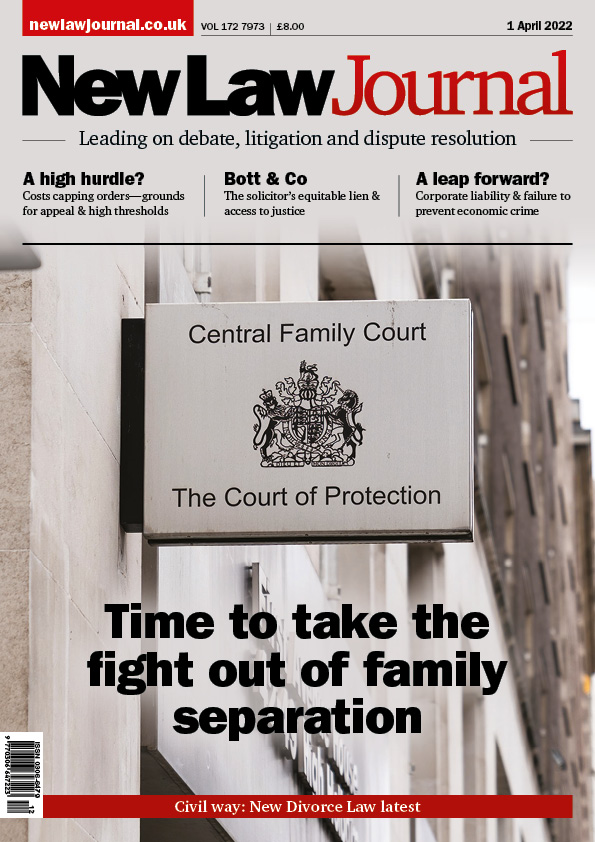THIS ISSUE

Bott & Co v Ryanair is an important development for access to justice, writes Anthony Field
Now is the time for radical change for separating families. Lauren Evans trumpets calls for better support for the children of separating parents
Jamie Sutherland & Imogen Dodds discuss the recent case of White and another v Amirtharaja and another
Masood Ahmed looks at the hurdles to be cleared before costs can be capped, with reference to PGI Group Limited
Chris Ball reports on the top market trends in legal recruitment
The UK should harness the full potential of its legal system to put the ‘great’ back in Great Britain, says Jason McCue
Employment compensation hike; Dentists extracted; Tribunal tinkering; Flexible tenancy escape; New divorce law latest; Standard orders – again! Up the workers.
Mark Pawlowski considers the use of literature in the law school curriculum
MOVERS & SHAKERS

NLJ Career Profile: Ken Fowlie, Stowe Family Law
Ken Fowlie, chairman of Stowe Family Law, reflects on more than 30 years in legal services after ‘falling into law’

Gardner Leader—Michelle Morgan & Catherine Morris
Regional law firm expands employment team with partner and senior associate hires

Freeths—Carly Harwood & Tom Newton
Nottinghamtrusts, estates and tax team welcomes two senior associates
NEWS
Children can claim for ‘lost years’ damages in personal injury cases, the Supreme Court has held in a landmark judgment
The Supreme Court has drawn a firm line under branding creativity in regulated markets. In Dairy UK Ltd v Oatly AB, it ruled that Oatly’s ‘post-milk generation’ trade mark unlawfully deployed a protected dairy designation. In NLJ this week, Asima Rana of DWF explains that the court prioritised ‘regulatory clarity over creative branding choices’, holding that ‘designation’ extends beyond product names to marketing slogans
From cat fouling to Part 36 brinkmanship, the latest 'Civil way' round-up is a reminder that procedural skirmishes can have sharp teeth. NLJ columnist Stephen Gold ranges across recent decisions with his customary wit
Digital loot may feel like property, but civil law is not always convinced. In NLJ this week, Paul Schwartfeger of 36 Stone and Nadia Latti of CMS examine fraud involving platform-controlled digital assets, from ‘account takeover and asset stripping’ to ‘value laundering’
Lasting powers of attorney (LPAs) are not ‘set and forget’ documents. In this week's NLJ, Ann Stanyer of Wedlake Bell urges practitioners to review LPAs every five years and after major life changes







